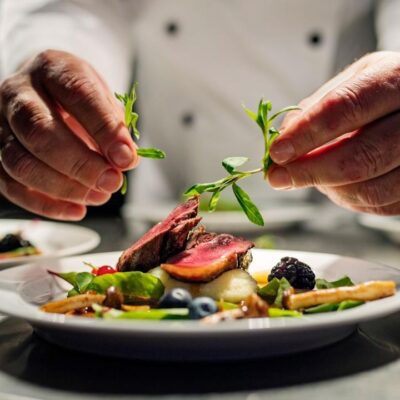Forged in tradition: an exclusive interview with Michele Massaro
In the world of haute cuisine, the knife is much more than just a tool: it is an extension of the chef’s hand, an object that embodies precision, art, and history. Few craftsmen have interpreted this complex relationship better than Michele Massaro, a master knifemaker who, from his forge in Maniago, creates custom knives for the finest Italian and international Michelin-starred chefs. With a deep connection to nature, unwavering dedication to tradition, and a keen eye for refined design, Massaro has achieved a perfect fusion of functionality and beauty.
In this exclusive interview for Elite Yachts Club, we explore the unique journey that led Michele to become the “knifemaker of chefs“, delving into the philosophy that drives his work and the passion he pours into every creation.
- Your career began with a leap of faith into traditional craftsmanship. Looking back, what motivated you to embark on a path that contrasts so strongly with modern technology? Michele Massaro: “I have always felt a strong connection to tradition and craftsmanship. My decision came when I first set foot in an old forge in Maniago. At that moment, I knew that was where I belonged. I wanted to revive an ancient craft that was authentic and rooted in manual skills, challenging the direction of modern industry, which tends to standardize everything.”
- You mentioned that simplicity is a goal. How do you maintain the balance between simplicity and the technical complexity that your knives require to meet the demands of the most discerning chefs? Michele Massaro: “Simplicity is not just about aesthetics; it is the result of complex research. Every knife must be functional for the chef who uses it, so the form must be balanced. I choose to remove rather than add, striving to maintain a clean yet effective design. Form follows action, and from there comes the simplicity I seek.”
- Your connection with nature is evident in your work, such as when you select wood for knife handles based on lunar phases and seasons. How has this connection with nature evolved over the years? Michele Massaro: “The connection with nature is an integral part of my creative process. When I choose wood for the handles, I consider the lunar phases and environmental conditions. This connection to the lunar phases is deeply rooted in my personal history: I spent my childhood alongside my grandfather, who passed on this knowledge to me. Since I began making knives, every choice has been guided by the moon’s cycles. Even today, in my daily life, I carefully observe the lunar phases; for example, if the moon is waxing, I prefer to dedicate myself to certain activities rather than others. With the waxing moon, some things are great to do, but not all. For instance, during the harshest winter with a waning moon, I go to the mountains in search of woods like hawthorn or dogwood. This respect for natural rhythms allows me to obtain quality materials and adopt a more sustainable approach to my work.”
- Working with Michelin-starred chefs like Fulvio Pierangelini must have been an extraordinary journey. Was there a particular moment that changed your perception of how to craft a knife? Michele Massaro: “Yes, every chef has taught me something valuable. A moment that deeply impacted me was my first encounter with Pier Giorgio Parini. Spending time in his kitchen and observing his movements made me realize how crucial it is to adapt each knife to the cook’s gestures. This radically changed my approach to design: every knife is created to meet a specific need.”
- Your knives reflect influences from art and music. How do these passions manifest in the design of your products? Is there a specific artwork or song that inspired one of your creations? Michele Massaro: “Art and music are constant sources of inspiration. When I think of a song, I try to infuse my knives with the same intensity and personality that great musicians impart in their works. If I were to compare myself to an artist, I would see myself alongside David Gilmour: just as he can play the same note for five minutes with a clean and unique sound, I aim to give my knives a distinctive and harmonious shape. For me, balance and beauty are essential, just like in a work of art. Each knife must have its own personality and harmony, becoming something more than just a tool.”
- Your aesthetic embraces imperfection as part of the process. What is the value of imperfection in your work and in your life? Michele Massaro: “Imperfection represents authenticity to me. The raw marks I leave on the knife blades tell their story, the process behind them. Valuing imperfection means embracing the uniqueness of each piece and respecting the raw material, which already has its own inherent beauty. This approach allows me to create objects that are not only functional but also convey emotion.”
- You have often spoken about the importance of functionality in a knife. What has been the most complex project you have undertaken in terms of functionality, and how did you overcome the challenge? Michele Massaro: “One of the most complex projects was the Parini 5 knife, an evolution of the Japanese Deba knife for fish. I can’t reveal how I achieved this result, as it involves my professional secrets and techniques. However, I can say that the final product is capable of performing precision tasks like a chef’s knife while maintaining the necessary sturdiness. The process was long, but the outcome was incredibly rewarding.”
- Many of your knives are custom-made for chefs, based on their movements in the kitchen. What process do you follow to turn these observations into a concrete design? Michele Massaro: “My process always begins with observation. However, there isn’t a true custom-made approach, but rather different types of knives depending on the work to be done. I don’t rely solely on the client’s requests but primarily on my experience and knowledge in production, which allows me to create functional and versatile knives.”
- Your knives are loved not only by professional chefs but also by cooking enthusiasts. What advice would you give to someone who wants to start building their own collection of artisanal knives? Michele Massaro: “My advice is to start with a few high-quality pieces, like a good chef’s knife. Investing in artisanal knives also means learning how to take care of them, so I recommend dedicating time to sharpening and maintenance. Artisanal knives are not just tools; they are unique pieces that deserve attention and respect.”
- Looking ahead, which new projects or collaborations excite you the most? Is there an unexplored field you’d like to approach with your craft? Michele Massaro: “The future always holds new challenges, and I can’t wait to explore them. I plan to work on new projects beyond knife making, but at the moment, I can’t reveal too much, as these initiatives have not yet been launched.”
Michele Massaro has shown us that craftsmanship can be as artistic as it is functional, and that imperfection can be a mark of uniqueness and authenticity. His knives are not merely kitchen tools but true works of art that tell a story: the story of the material, the hand that forged it, and the gesture of the chef who uses it. With deep respect for tradition and an innovative approach, Massaro continues to challenge himself and the world of craftsmanship, keeping the art of knifemaking alive in an era of mass production.
At Elite Yachts Club, it is an honor to share the vision and artistry of Michele Massaro, an artist who has transformed an ancient craft into a form of contemporary expression destined to endure.


